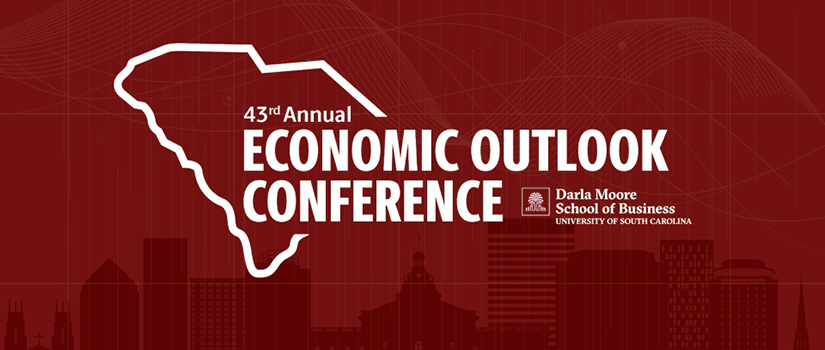University of South Carolina releases 2024 economic forecast — Palmetto State’s economy likely to cool in the new year
South Carolina is poised for continued growth in 2024, following a year of steady consumer spending, historically low unemployment and significant wage growth, according to University of South Carolina economists Douglas Woodward and Joseph Von Nessen at the Darla Moore School of Business.
The outlook, which was presented on Tuesday, Dec. 5, during the 43rd Annual Economic Outlook Conference, highlighted how the state’s economy will likely continue to grow — albeit at a slower rate — as rising interest rates and high inflation have begun to take their toll on the state’s economy.
“South Carolina’s economy remains relatively healthy, but it is still in the midst of a major readjustment, and the outcome is far from certain,” said Von Nessen, research economist in the Moore School’s Division of Research. “Higher interest rates have slowed demand in 2023 and are putting the brakes on inflation and an overheated economy, but there is still a chance that this slowdown continues for too long and could lead to a recession next year.”
South Carolina’s economy readjustment has been most visible in the housing and manufacturing industries. Higher interest rates have increased the cost of borrowing money, which has slowed the demand for big-ticket items, including the demand for new homes, vehicles and large appliances.
“The housing industry has been on the front lines in the current battle against inflation because it was immediately impacted when interest rates first began to rise in 2022,” Von Nessen said. “The benefit to being hit first, however, is that the housing market may also be the first to stabilize. Although total housing sales decreased by 23 percent statewide in 2022, they decreased by 6 percent in 2023, suggesting that the housing market’s readjustment period may be coming to an end.”
Woodward, Moore School economics professor, and Von Nessen also pointed out that even though rising interest rates have helped lower the current U.S. inflation rate to 3.2 percent this year, consumers are still being adversely impacted by higher prices.
“We have to keep in mind that a declining inflation rate just means that prices are not rising as fast. It doesn’t mean that current prices are moving back down to pre-pandemic levels,” Von Nessen said. “Wages in South Carolina have increased by an average of 15 percent since 2020, but inflation has risen by 18 percent. The average South Carolinian has lost purchasing power over the past three years.”
Is a recession inevitable? Woodward and Von Nessen say no, but it primarily depends on how quickly inflation subsides.
“The Federal Reserve has been crystal clear that their top priority is getting inflation down to 2 percent, even if it requires a recession to get there,” said Von Nessen. “However, the good news is that the biggest contributor to inflation right now — housing costs — have been steadily falling. This makes us increasingly optimistic that the U.S. economy may achieve 2 percent inflation in 2024, and the Federal Reserve can claim mission accomplished.”
The economists also stressed that even if the Palmetto State were to face a recession in 2024, it would likely have minimal effects on the job market.
“Every industry in South Carolina is facing a labor shortage, which is largely the result of South Carolina’s aging population,” Woodward said. “As a result of this worker scarcity, businesses are now more likely to retain their employees whenever possible during economic downturns in order to prevent having to find new workers when the economy later recovers.”
This year’s Economic Outlook Conference also featured a panel discussion, moderated by Ashely Teasdel, the deputy secretary of the South Carolina Department of Commerce, on the coming infrastructure expansion in South Carolina and its role in the state’s long-run economic competitiveness. Panelists included:
- Bonnie Ammons, Executive Director, South Carolina Rural Infrastructure Authority
- South Carolina Rep. Gary S. Brewer Jr.
- Justin Powell, Chief Operating Officer, South Carolina Department of Transportation
- Matt Reiffer, Vice President for Infrastructure Programs, American Council of Engineering Companies
